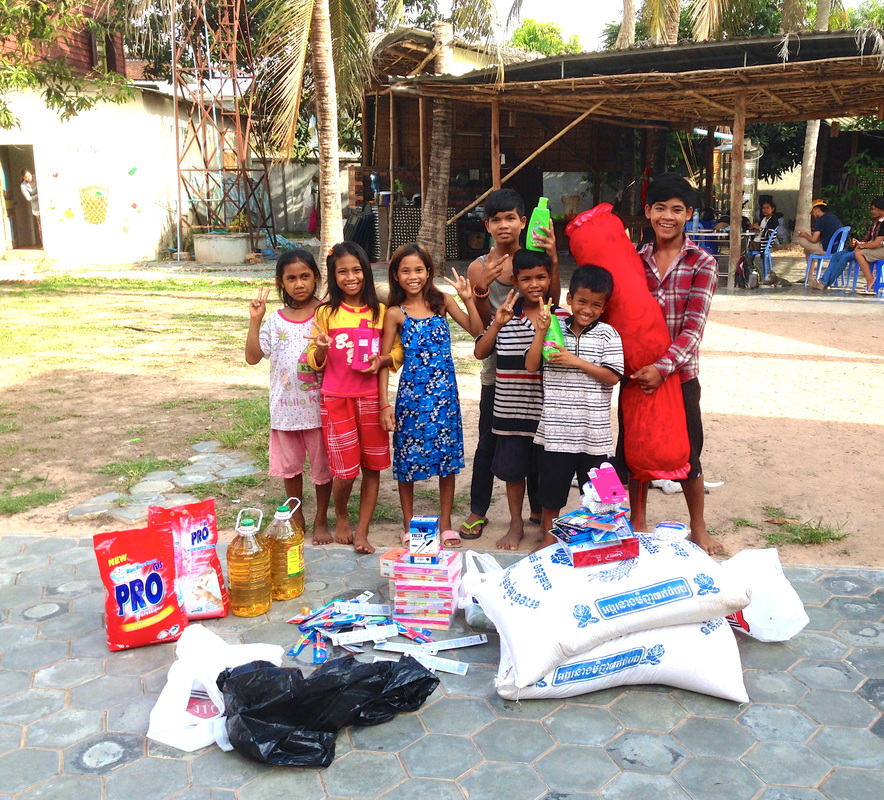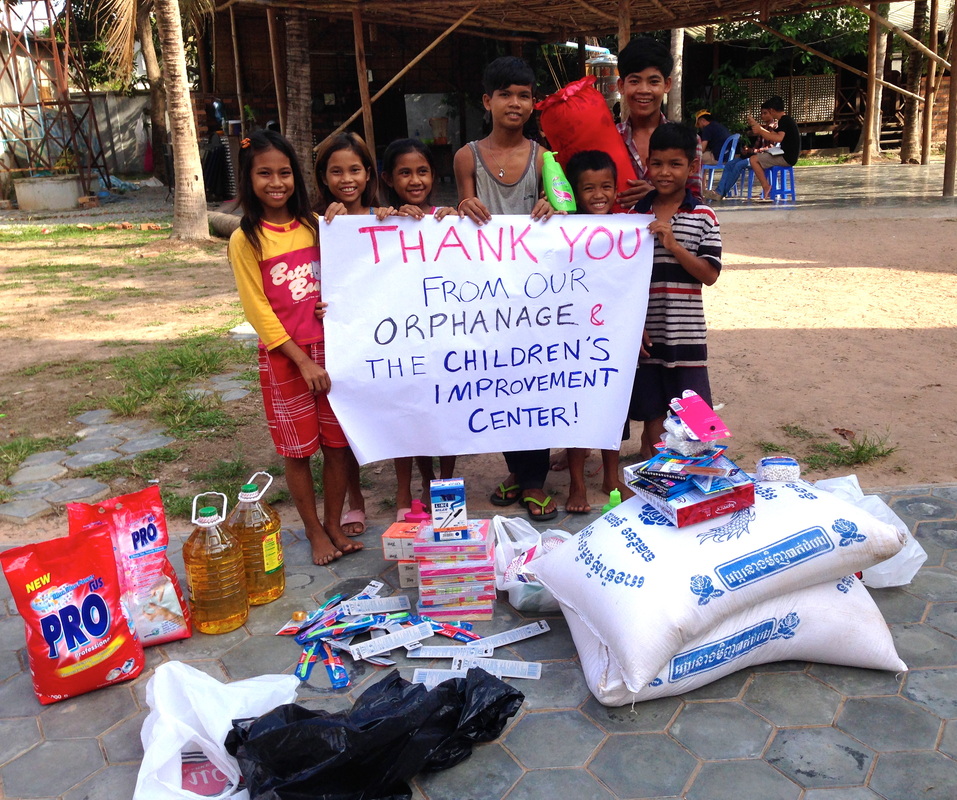| By now, many of you know the story of Jenny and Jenna, orphaned sisters here in Cambodia that grew up in desperately poor circumstances, separated from each other and with no food, money, or anyone to care for them. Luckily, they were helped few years back by an American expat, Cowboy Bart, who managed to reunite the sisters and arrange for them to live with a family in a jungle province not far outside the main city. Things were better but they still lived in humble circumstances, with barely enough food, attending school only sporadically, and having to sleep outdoors many nights. But things got much better for Jenny and Jenna recently. Thanks to your generous donations, and the hard work of the true champions in their lives – two Cambodian medical students nicknamed Keep Calm and Keep Hope, along with Cowboy Bart, they were accepted into an orphanage in Siem Reap, a northern tourist town where Angkor Wat is located. The orphanage, the Children’s Improvement Organization, was founded by a kind local man named Sitha Toeung. The girls safely transitioned up there a couple weeks ago after a hot, bumpy bus ride with Keep Calm and Keep Hope. But before they went we brought them into the big city of Phnom Penh for a going away celebration, a day of fun and firsts they’ll never forget! Today is my last day in Cambodia before I make my way back to the United States after a whole year in southeast Asia, 4 months of which was spent in this beloved country of Kampuchea, or Cambodia. So I couldn’t think of a more fitting goodbye than to travel up to Siem Reap to visit Jenny and Jenna at the orphanage to say goodbye before departing on a plane tomorrow. The last time I wrote about the girls, and also the “Children of the Trash,” in Steung Meanchey, I was bombarded with donations and well-wishes from friends from all over the world. I put that money to good use here in Siem Reap, hitting the local market today to buy all the things the orphanage needs: two huge 50kg bags of rice, 2 jugs of cooking oil, industrial-sized laundry detergent, boxes of snack food, 25 toothbrushes, toothpaste, plenty of bottles of shampoo and soap, combs and brushes, notebooks and pens for school, art supplies, and a full bedcover set for the girls. On this, my last evening in town and in Cambodia after 4 months here, I hired a taxi to drive me out to the orphanage to meet up with the girls. Eager with anticipation all day, it was heartwarming to have the girls run up to me with big hugs when I arrived. I was pleased to see that the orphanage was a much nicer set up than their last family in the province, with big thatched bungalows high up on stilts (to keep away from floods during the rainy season and any critters that might venture in,) a wide open courtyard, a locking gate and fence to keep the children safe, a big separate outhouse facility, and a serviceable outdoor kitchen under a tin roof. It was spotlessly clean and all the kids appeared pleasant and cared for, if not a little shy at this foreigner's caravan arriving. Jenny and Jenna looked happy and healthy, and Sitha confirmed that they were doing well – fitting it well with the other kids and making friends. He did mention that they were lagging way behind the other kids their age in school, unable to read or write even their own Khmer language fluently because of sporadic attendance in the past. But he assured me that they would catch up and learn well in time, and the orphanage even employed an English tutor on site to teach the kids in the afternoons, a huge advantage as most of the decent jobs require English in a country becoming increasingly dependent on tourism. Sitha himself, he confessed, didn’t even start school until he was 20 years old, but he earned a college degree not long after. His story is an incredible one – as dark and at the same time as uplifting as the human spirit can endure, like so many Cambodians who lived through the Khmer Rouge years of genocide and mass starvation. He was born in 1969, only 6-years old when Pol Pot and the Khmer Rouge came to power and systematically mass murdered 1.5 million people – about 25% of the country’s population - within only 3 ½ years. Sitha told me that as a boy in Phnom Penh he grew up near the high school – then converted into an infamous prison and torture chamber. He used to climb a palm tree and look over the fence to see people being tortured on a daily basis. (continued at right) | (continued) Sitha survived the scarce years after the war living in a pagoda upon the mercy of monks, and soon turned his trauma to something better – founding the Children’s Improvement Organization, where he's dedicated his days helping impoverished and orphaned children. We talked briefly about these things, almost in whispers, as Jenny and Jenna and the kids ran and played with far fewer cares in the world than he'd had. How far the people have come and how much healing has taken place in only one generation, we agreed, something to hang our hopes on even if things were still very hard for people in Cambodia. Soon, nothing but joy and laughter resumed, as my taxi driver helped me unload all the goodies I brought for them. They stood in a big circle out under the sun and helped me take everything out of the bags, lay it out for display so they could pick it up and talk about it, and then put it all in the bags again. Sitha gave me a quick tour and Jenny and Jenna showed me their bungalow, where they slept on the floor on bamboo mats along with 10 other girls. Sitha also introduced me to his lovely wife, a kind soul if there ever was one, and the four young Taiwanese volunteers who had been helping the orphanage for the last year. In fact, most of the buildings had been donated by Taiwanese organizations and their biggest donor was a kind-hearted but common Australian woman. It was always a concern where the next donation would come from, and already he was worried about securing a renewal on the orphanage’s lease once their current one was up in a year. I’d felt good for bringing so many things, but seeing that it had to take care of 37 children, I wished I brought more. The bags of rice, seemingly enormous when I purchased them in the market, were dragged away to the kitchen by two skinny, shirtless Cambodian kids who looked 5 years younger than 13 and 14, their real ages, because of malnourishment. “How long will one of those bags last, I asked Sitha.” “2 ½ or 3 days if they’re lucky,” he said, “ We have 37 kids and they eat rice three meals a day, so it goes fast.” I couldn’t help but think, what would happen when those bags ran low? For a second, I glimpsed the panic that must engulf their every day, though it was such a familiar play thing it was now just called, “life.” The wind picked up and dark clouds rolled in from the horizon, stirring palm trees and sending street dogs barking. It was monsoon season and we had some dirt roads to traverse back to town, so it was with unspoken agreement that we moved toward the taxi and said our goodbyes before we got caught in a squall. Saying goodbye to Jenny and Jenna was one of the hardest things I’ve ever had to do. They hugged me and we waved goodbye furiously, the only real method of communication because they didn’t speak English and I, very little Khmer. With Sitha’s translation, I told them that I’d be back as soon as I could, maybe 6 months, and that I would stay in touch with him and make sure they had everything they needed. They smiled and hugged me. I made my way five steps toward the taxi, and they hugged me again. We went on like this again and again, until I had tears in my eyes, hidden by my sunglasses so my concern wouldn’t diminish their smiles at all. How could I just walk away? Six months was a long time – if that would happen at all. What if I couldn’t come back? What if they didn’t have enough food, or the orphanage enough money to renew their lease? What if some other malady fell upon them, like what happens with too many Cambodian children? How could I possibly keep them safe? And all of the other 37 children in the orphanage that were quickly wining my heart? This time, I turned and hugged them before climbing into the taxi. I would find a way. We drove off, all of us waving vigorously until the very last second, when we turned a corner and Jenny and Jenna were out of site, but with me more than ever. -Norm :-) Email me if you'd like to help. |
|
2 Comments
Norm
6/9/2014 01:02:03 pm
Thanks so much Jim! I really appreciate that! Hope to meet you soon! N
Reply
Leave a Reply. |
Norm SchrieverNorm Schriever is a best-selling author, expat, cultural mad scientist, and enemy of the comfort zone. He travels the globe, telling the stories of the people he finds, and hopes to make the world a little bit better place with his words. Categories
All
Archives
October 2022
|



 RSS Feed
RSS Feed